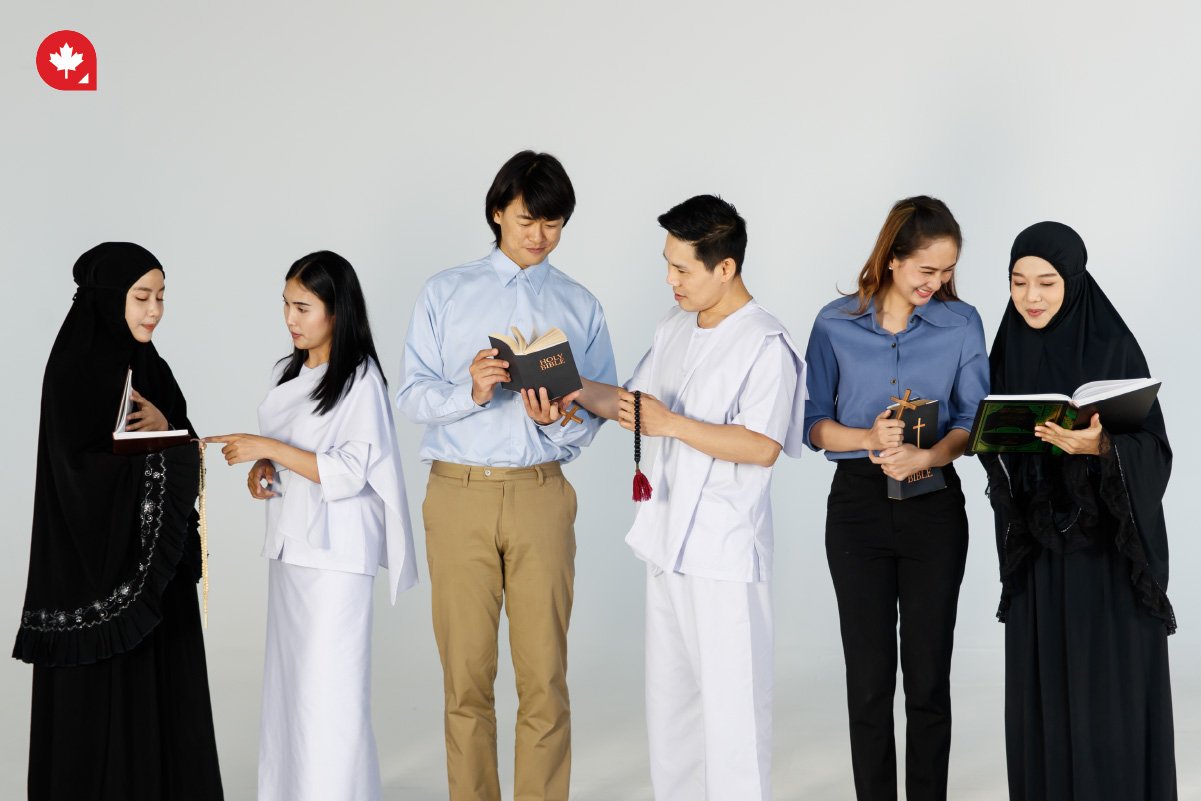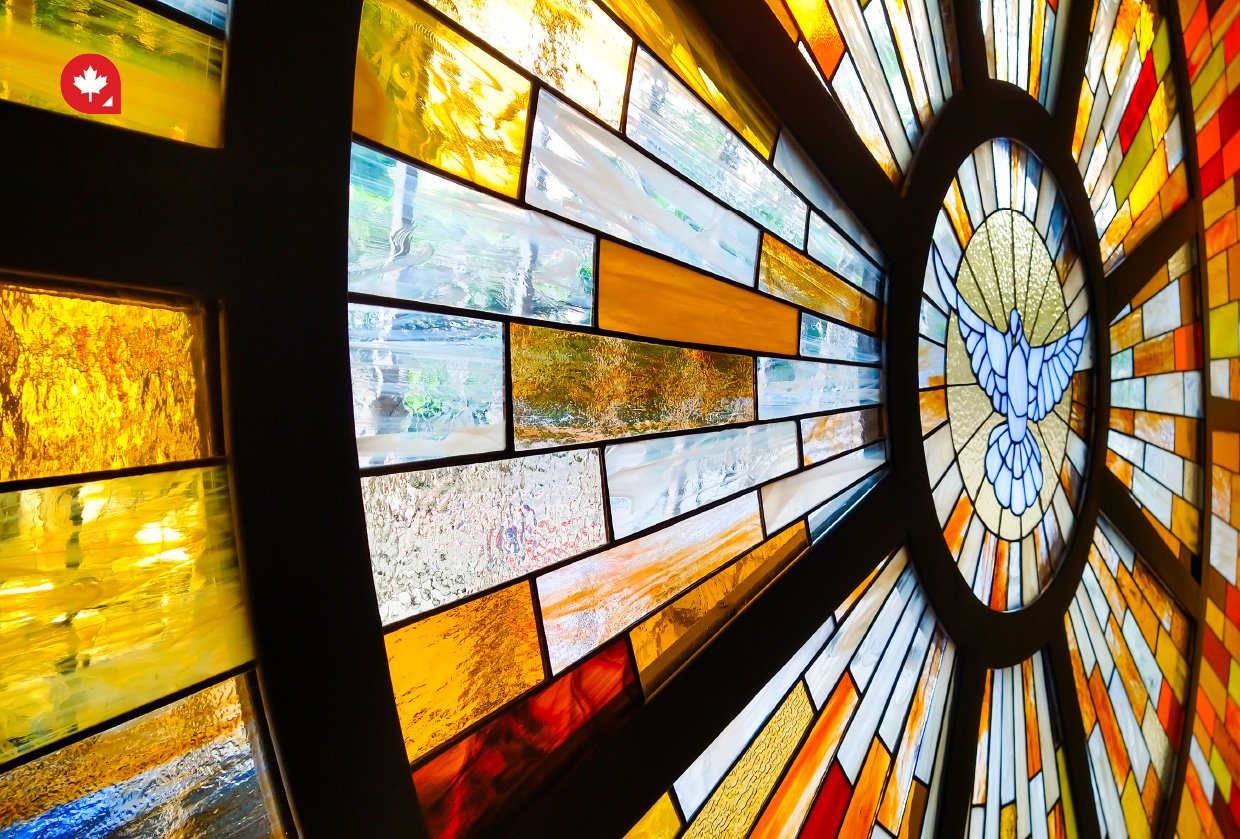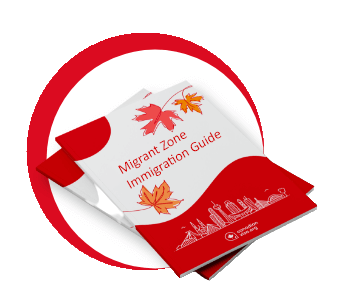Canada is a country that values diversity and promotes religious freedom. This is evident in the Canadian Charter of Rights and Freedoms, which guarantees the freedom of conscience, religion, thought, belief, opinion, and expression, as well as the right to equal protection and benefit of the law without discrimination based on religion. Despite the reference to God in the preamble of the charter and the title of the monarch as "Defender of the Faith," Canada has no official religion. Instead, support for religious pluralism and freedom of religion is an important part of Canada's political culture.
Canada is known for its ethnocultural and religious diversity, which is a characteristic of the country that is valued by the vast majority of Canadians. According to the 2020 General Social Survey, 92.0% of the population aged 15 and older agreed that ethnic or cultural diversity is a Canadian value. This diversity is reflected in the population's origins and religions, which have been measured by the Canadian census since 1871.
Over time, the mosaic of diversity in Canada has been evolving, and to reflect the changing and complex nature of diversity in the country, Statistics Canada has conducted extensive engagement and research to improve the collection and measurement of the ethnocultural and religious diversity of the population as well as the terminology used to describe it.
To modernize the technology used to collect, process, and disseminate census data, the 2021 Census electronic questionnaire included links to pages with hundreds of examples of ethnic or cultural origins and religions. This approach helped respondents answer the question more accurately and provided more detail on the ethnocultural and religious facets of society than ever before. As a result, more than 450 ethnic and cultural origins, 200 places of birth, 100 religions, and 450 languages have been included in this census.
In Canada, everyone plays a fundamental role in shaping the diverse landscape of the country, including their ancestors, parents, and grandparents. Promoting religious freedom and celebrating diversity are integral parts of Canada's political culture and society.
How to Find Your Place of Worship

There are many ways of finding a place to worship in your area. Many television programs and radio stations are dedicated to different religions and provide up-to-date information on upcoming cultural events. Of course, you can also rely on search engines such as Google.
Many publications celebrate your unique culture and beliefs, so have a look at your local listings, and you may find that there is information about finding a place of worship. Meeting new people in your neighborhood can help you decide where you want to worship.
Mosques and Islamic Centres
Mosques and Islamic centres play a vital role in providing religious and educational services for the Muslim community in Canada. The Muslim Association of Canada (MAC) is a non-profit organization that operates in 13 Canadian cities, with a vision to establish an Islamic presence in Canada that is integrated within the social fabric and culture of Canada.
MAC's mission is to build Muslim individuals who are spiritually connected, strongly grounded in their own faith, and have an understanding of what Islam means in the modern world. The organization achieves this by providing religious and educational services, such as Islamic classes and lectures, youth programs, and interfaith activities. These services help the Muslim community in Canada to maintain their connection with Islam and build a sense of community among themselves.
The London Muslim Mosque (LMM) is one of the first mosques built in Canada and is an essential centre for supporting the Muslim community in London, Canada, and the surrounding areas. The mosque provides a range of services, including Friday prayers, Eid celebrations, educational programs for children and adults, and community events. LMM has exerted tremendous efforts to establish a great position and service among the Muslim citizens of London and its surroundings.
Mosques and Islamic centres like LMM play a significant role in promoting religious tolerance, understanding, and respect. They serve as a bridge between different faith communities and promote interfaith dialogue and cooperation. Mosques and Islamic centres also provide a platform for Muslims to engage with the wider community and promote the values of peace, tolerance, and social justice.
For more information, visit the Islamic Supreme Council website
Hindu Temples
Hindu temples are important religious and cultural institutions for the Hindu community in Canada. One of the most prominent Hindu temples in Canada is the BAPS Shri Swaminarayan Mandir in Toronto, Ontario. This temple is Canada's first hand-carved stone and marble Hindu temple built according to ancient Indian principles. The temple is a stunning structure that evokes the mystical beauty and spiritual essence of India.
The BAPS Shri Swaminarayan Mandir is an architectural marvel that showcases the rich cultural heritage of India. The temple is designed and built according to ancient Indian principles, and every aspect of the temple, from the intricate carvings to the ornate decorations, reflects the deep spiritual beliefs of the Hindu community.
The temple is not only a place of worship but also a hub of cultural activities and events that bring the community together. The temple offers a range of services, including daily prayers, religious ceremonies, and cultural programs that promote the values of peace, harmony, and tolerance.
Another notable Hindu temple in Canada is the Hindu-Mandir in Montreal, Quebec. Established in 1990, the temple serves the Indo-Canadian community of Montreal. The primary aim of the society is to build a temple and a community center to meet the spiritual, ritual, ceremonial, and social needs of Hindus.
The vision of the Hindu-Mandir is to build a grand temple where people who believe in Hinduism can come together and pray. The temple is a symbol of the vibrant Hindu community in Canada and is a testament to the community's dedication to preserving and promoting their cultural heritage.
For more information, visit the Canadian Hindu Association website
Christian Churches
Christian churches are an integral part of the religious landscape in Canada. While Catholicism is the dominant Christian denomination, there are many non-Catholic Christian churches in Canada that are thriving and growing. Two such churches are Grace Fellowship Church and Hillsong Church.
Grace Fellowship Church is a non-denominational Christian church located in Toronto, Ontario. The church's mission is to "love God, love people, and make disciples." They strive to create an environment where people can come together to worship, connect, and grow in their faith.
The church offers a range of programs and services, including Sunday worship services, youth programs, Bible studies, and small group gatherings. Their community outreach programs include feeding the homeless, supporting refugees, and providing assistance to those in need.
Hillsong Church is a global Christian church movement with locations in many countries, including Canada. The church's mission is to "reach and influence the world by building a large, Christ-centered, Bible-based church, changing mindsets and empowering people to lead and impact in every sphere of life."
Hillsong Church offers a range of programs and services, including Sunday worship services, youth programs, and small group gatherings. The church is known for its contemporary worship music and has produced many popular worship albums.
Both Grace Fellowship Church and Hillsong Church are excellent examples of churches in Canada that are thriving and growing. They play an important role in promoting Christian values, community outreach, and spiritual growth among their members.
For more information, visit the Congregational Christian Churches in Canada website

Catholic Churches
Catholicism has a rich history in Canada, dating back to the arrival of French explorers and missionaries in the 16th century. Today, Catholicism is the largest Christian denomination in Canada, and Catholic churches can be found in cities and towns throughout the country.
One of the most iconic Catholic churches in Canada is the Basilique-cathédrale Notre-Dame de Québec, located in Quebec City. This historic cathedral was completed in 1647 and has been designated as a UNESCO World Heritage Site. It serves as the mother church of the Roman Catholic Archdiocese of Quebec and is a popular destination for tourists and pilgrims alike.
Another notable Catholic church in Canada is St. Patrick's Parish in Toronto, Ontario. This vibrant community has been serving the Catholic population of Toronto since 1851 and is one of the oldest parishes in the city. St. Patrick's offers a range of services and programs, including daily mass, confession, and prayer groups.
Catholicism in Canada is more than just attending mass on Sundays. It also includes a commitment to social justice and community outreach. Catholic organizations in Canada, such as Development and Peace and the Catholic Women's League of Canada, work to promote social justice and provide assistance to those in need.
Catholic schools also play an important role in the Catholic community in Canada, providing education rooted in Catholic values and traditions. Catholic schools are found in many provinces, and their graduates go on to make significant contributions to Canadian society in a variety of fields.
For more information, visit the Canadian Conference of Catholic Bishops website.
Buddhist Temples
Buddhism is a minority religion in Canada, but it has a rich history and a strong presence in many cities across the country. The Buddhist Prajna Temple and Karma Sonam Dargye Ling Temple are two prominent centers of Buddhist worship and practice in Canada.
The Buddhist Prajna Temple, located in Richmond, British Columbia, is a Chinese Buddhist temple that offers a wide range of services and programs for the local community. The temple was founded in 1980 by Venerable Guan Cheng, a renowned Buddhist monk from Taiwan. The temple's main hall features a large statue of the Buddha, surrounded by intricate carvings and decorations. The temple offers regular meditation sessions, Dharma talks, and special events throughout the year, such as the annual Vesak Day celebration.
The Karma Sonam Dargye Ling Temple, located in Toronto, Ontario, is a Tibetan Buddhist temple that was founded in 1976 by the Venerable Namgyal Rinpoche. The temple offers a variety of services and programs, including daily meditation sessions, teachings on Buddhist philosophy and practice, and special events such as the annual Tibetan New Year celebration. The temple also has a library with a wide selection of Buddhist texts and resources.
One unique aspect of the Karma Sonam Dargye Ling Temple is its Tibetan language program. The temple offers free weekend classes for those interested in learning the basics of the Tibetan language. The classes are taught by experienced Tibetan teachers and are open to students of all levels, from beginners to advanced learners.
Both the Buddhist Prajna Temple and Karma Sonam Dargye Ling Temple are important centers of Buddhist worship and practice in Canada, serving as spiritual homes for many Buddhists in the country. They are also valuable resources for those interested in learning more about Buddhism and its rich history and traditions.
For more information, visit the International Buddist Society website
Jewish Synagogues
Judaism in Canada has a rich history dating back to the 18th century when the first Jewish settlers arrived. Today, the Jewish community in Canada is one of the most vibrant and diverse in the world. There are several notable synagogues across the country, including Congregation Shaar Hashomayim, Congregation B'nai Tikvah, and the Bagg Street Shul in Montreal.
Congregation Shaar Hashomayim is one of the oldest and most prominent synagogues in Canada. Founded in 1846, it is located in Westmount, a wealthy suburb of Montreal. The synagogue is known for its beautiful architecture, including stained-glass windows and a soaring central dome. It has a long history of attracting prominent members of the Jewish community, including the Bronfman family, who have been members for generations.
Another notable synagogue in Canada is Congregation B'nai Tikvah, a Reform synagogue located in Niagara Falls, Ontario. Founded in 1965, the synagogue has a strong commitment to social justice and inclusivity. Its members are actively involved in local and national efforts to promote equality and fight against discrimination.
The Bagg Street Shul, located in the Mile End neighborhood of Montreal, has a unique history. Originally a two-family residence, it was purchased by a group of Jewish immigrants in 1921 and converted into a synagogue. Today, the shul is a beloved community center that hosts a wide range of events and activities, from religious services to cultural events and community gatherings.
The community continues to thrive, with a strong commitment to social justice, inclusivity, and cultural preservation. Whether you are a member of the Jewish community or simply interested in learning more about this rich and diverse culture, Canada has much to offer.
For more information, visit the Jews For Judaism website.
How Can We Help You Move to Canada?

If you are interested in moving to Canada, it is important to do your research and ensure that you work with a reputable immigration consultant. RCICs are authorized to provide immigration advice and services, and they can help you navigate the complex process of immigrating to Canada. We can help you understand the options available and connect you with a qualified RCIC who can help you achieve your goals.
FAQs
What is the Most Common Religion in Canada?
Christianity is the most common religion in Canada, with approximately 67% of the population identifying as Christian. Other significant religious groups in Canada include Islam, Hinduism, Buddhism, and Judaism.
Are There Restrictions on Religious Freedom in Canada?
No, Canada is a multicultural and pluralistic society that recognizes and protects religious freedom as a fundamental human right. The Canadian Charter of Rights and Freedoms guarantees the right to freedom of conscience and religion.
Are There Many Different Types of Places of Worship in Canada?
Yes, there are many different types of places of worship in Canada, including churches, mosques, synagogues, temples, and gurdwaras. These places of worship vary in size, architecture, and cultural traditions.




